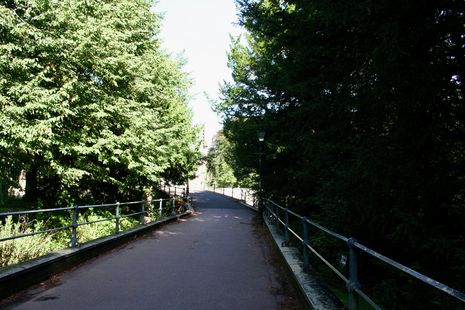Welsh, working class, and LGBT
Staff writer Joe Tresidder explores how his identity has shaped his Cambridge experience, and discusses what needs to be done to help support the diverse student body

Student life at Cambridge is often like being on a rollercoaster: you never really know what to expect. Since starting Cambridge two years ago, my friends and I have experienced both highs and lows. From fancy college formal dinners and premature yet blissful Bridgemas celebrations at the beginning of December, to essay dilemmas and a whirlwind of Covid disruption, many of us students have gone through the full range of human emotions. With the start of my year abroad last September came a much-needed break from the unpredictable rollercoaster ride that is student life at Cambridge. This respite, and the distance which it provides me with, offers the perfect moment to take stock of my experience of studying in such an idiosyncratic institution as someone who has both felt welcomed and an outsider.
Everybody experiences university differently. Because of this, I decided against describing myself as a ‘typical’ Cambridge student, as I asked myself, ‘What does the phrase ‘typical student’ even mean when there is so much diversity of backgrounds and experiences within our large student community?’
"I sometimes feel like a minority within a minority within another minority at Cambridge."
I also believe, based on my time at Cambridge, that we are all conditioned to some extent by our upbringings, our privilege (or lack thereof) and the ‘bubbles’ which each of us lived in before university. These influences shape our perspectives on a range of issues in life, and explain why some of us have similar experiences at university but not exactly the same ones. It is these diverse experiences that I wish to discuss.
I said that I have felt both welcomed and an outsider at Cambridge, and I stand by this rather oxymoronic statement. As a Welsh guy from a culturally working-class background who also happens to be part of the LGBT community, I sometimes feel like a minority within a minority within another minority at Cambridge. For example, despite some progress made by Cambridge University in improving access to working-class applicants, it is still a place where the voices of the upper class and upper-middle-class people are often louder than those of students from more deprived backgrounds, and where working-class students continue to be outnumbered. Historically, Cambridge admissions of Welsh applicants have lagged behind the figures in other, more prosperous areas of the UK. And let’s not forget that problems with loneliness among LGBT students persist, as some find it challenging to make meaningful connections with other LGBT students. This is partly due to the lack of dedicated, safe spaces in which these conversations can take place, and also because of the isolation of LGBT communities from each other that can occur within the collegiate system.
"good-intentioned conversations about issues such as class, identity and sexual orientation are never a bad thing"
I don’t want people to think that I have felt ostracised by Cambridge University. This could not be further from the truth. From the moment I arrived, it was clear that the teaching staff would not judge me on who I am or where I am from, but rather on my work. Personally, I have never felt discriminated against as a member of the LGBT community or as someone from a working-class background. After having not felt safe enough to be open about my sexual orientation in school, I am especially grateful that university has given me the freedom to be myself without fear of judgement, although I’m nevertheless aware that not everyone is able to enjoy this.
For me, the main challenge with being Welsh, working-class and part of the LGBT community at Cambridge has been trying to find fellow students with whom I can relate and discuss these specific experiences. For too many students from similar backgrounds to mine, searching for like-minded people can be like trying to find a needle in a haystack, with students being spread out in different colleges and not always ready to be open about their personal experiences. This is not to say that I didn’t benefit from my friends at college, who, although nearly all heterosexual and from different class backgrounds and areas of the UK, has always been reliable when it comes to providing company and advice. Nevertheless, the problem for students from underrepresented areas of the UK, from the LGBT community, or from a working-class background is not about making friends, as they can do this. Rather, it is finding amongst those friends people who come from similar backgrounds. It is these friends who would be able to fully empathise with and understand complex, lived experiences such as being LGBT or being working class at such a traditional and prestigious institution, as they will have likely confronted similar barriers and felt similar emotions at certain points.
As I see it, another reason why students of a similar background to mine may feel isolated despite having friends is that too often issues such as class or sexual orientation are swept under the rug. Their impacts are often not addressed in friendship groups, where they are seen as heavy and emotionally charged issues which could potentially make other people present, who may have never had the same experiences of being in a marginalised group, feel uncomfortable or like they are being lectured. And when class and sexual orientation are tackled on the curriculum, it is often through an academic and theoretical lens that is somewhat distanced from the current experiences of students. It’s true that there is a time and a place for such complex and emotive issues to be discussed. However, good-intentioned conversations about issues such as class, identity and sexual orientation are never a bad thing, as they might just make someone feel less alone and more understood, perhaps even for the first time in their life.
What I want people to take from this article is that we all have different experiences and identities which shape us and that it is beneficial to talk about them. To all the other working-class and/or LGBT students out there who feel slightly adrift from the rest of their peers, know that you are not alone and that there are others out there who are probably feeling the same. This year, let’s resolve to make student life even more inclusive and enjoyable by acknowledging and talking about what makes us different, whatever that may be, so that we can learn from each other and become even more tolerant. Dedicated spaces and groups where students from under-represented backgrounds can meet and discuss should also be encouraged, so that everybody can feel that there is a place for them in student life and can find their crowd of like-minded friends.
 Features / Should I stay or should I go? Cambridge students and alumni reflect on how their memories stay with them15 December 2025
Features / Should I stay or should I go? Cambridge students and alumni reflect on how their memories stay with them15 December 2025 News / Cambridge study finds students learn better with notes than AI13 December 2025
News / Cambridge study finds students learn better with notes than AI13 December 2025 News / Dons warn PM about Vet School closure16 December 2025
News / Dons warn PM about Vet School closure16 December 2025 News / News In Brief: Michaelmas marriages, monogamous mammals, and messaging manipulation15 December 2025
News / News In Brief: Michaelmas marriages, monogamous mammals, and messaging manipulation15 December 2025 Comment / The magic of an eight-week term15 December 2025
Comment / The magic of an eight-week term15 December 2025









